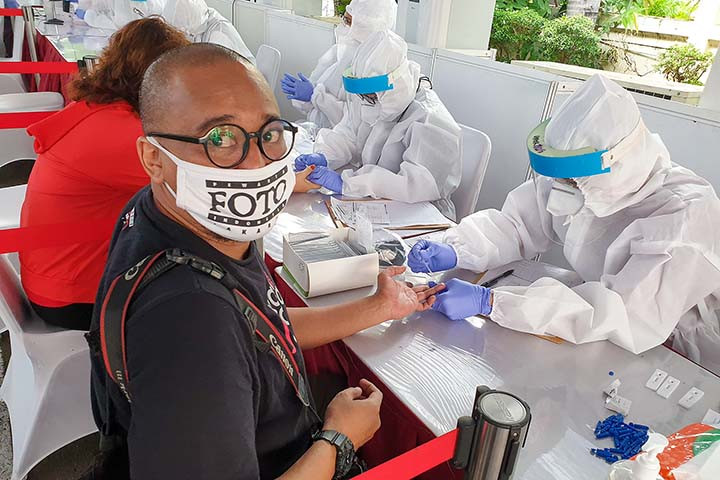Popular Reads
Top Results
Can't find what you're looking for?
View all search resultsPopular Reads
Top Results
Can't find what you're looking for?
View all search results‘Rapid test is a commercial commodity’: Ombudsman
Change text size
Gift Premium Articles
to Anyone
 Needle time: Indonesian Photojournalist Association (PFI) chairman Reno Esnir looks at the camera while a medical worker takes his blood sample during free COVID-19 rapid testing at the Press Council on Jl. Kebon Sirih in Central Jakarta on Sunday. The PFI organized the rapid testing, which was open to the public, for COVID-19 detection and tracing. (JP/R. Berto Wedhatama)
Needle time: Indonesian Photojournalist Association (PFI) chairman Reno Esnir looks at the camera while a medical worker takes his blood sample during free COVID-19 rapid testing at the Press Council on Jl. Kebon Sirih in Central Jakarta on Sunday. The PFI organized the rapid testing, which was open to the public, for COVID-19 detection and tracing. (JP/R. Berto Wedhatama)
T
he Indonesian Ombudsman has urged the government to review the regulation on COVID-19 rapid tests as there might be price discrepancies between test providers, resulting in people being charged “unfair” prices for the test.
Following the circular letter issued by the Health Ministry on Monday, which set a price ceiling of Rp 150,000 (US$10.49) for the COVID-19 rapid test, the ombudsman presumed that some stakeholders might be using the test and the pandemic situation to make a profit.
Central Java Ombudsman member Siti Farida said “the state should have made rapid tests free of charge or at least subsidized the test,” as it was hoped to curb the spread of the virus.
According to her, the Central Java Ombudsman found that some hospitals in the region were charging up to Rp 500,000 for one rapid test kit and service.
“If the rapid test can further contain the spread of the virus, mass rapid tests should have been done wherever a mass crowd is found. But the service has shifted substantially as it is now a mere commercial commodity,” Farida said on Thursday as quoted by kompas.com.
Farida went on to say that there were only several independent rapid tests in the capital city of Central Java province, Semarang, and it was performed without any clear standard. She stated her concern as crowded places such as bus stops, ports, terminals and train stations in the region were rarely targeted for mass rapid tests.
Even though some COVID-19 rapid test centers have adhered to the ministry’s price ceiling, the Central Java Ombudsman on Thursday reported that several hospitals were still charging prices ranging from Rp 250,000 to Rp 500,000 for a rapid test service.
Nevertheless, the deputy chairman of the Indonesian Medical Association (IDI) Slamet Budiarto deemed the government “too reckless” for issuing such a regulation. He argued that the price ceiling of Rp 150,000 would not be enough to cover all the expenses needed for one rapid test.
“The basic price for a rapid test [kit] is between Rp 150,000 and Rp 200,000,” he said as quoted by tempo.co. Meanwhile, there are still many other components, which require financial expenses namely the disposable medical kits, personal protective equipment and the medical services.
In other words, hospitals still need to cover the expenses of other components if they choose to adhere to the ministry’s price ceiling.
“The ministry should have standardized the highest retail price for a rapid test [kit], not for the [entire] service price,” he said, indicating that the government should not have burdened the hospitals with the remaining costs.
Prior to the Health Ministry’s circular letter, Transportation Minister Budi Karya Sumadi said he had asked the Finance Ministry to subsidize rapid tests for public transportation users as they are required to submit negative COVID-19 tests before taking long-distance journeys.
The request was made following numerous complaints over the high prices of rapid tests and polymerase chain reaction (PCR) tests.
As of Wednesday, nearly 970,000 samples had been tested nationwide. The official data show that 68,079 cases of COVID-19 have been identified in Indonesia, with 3,359 deaths. Not only is the test currently unaffordable for many people, but stigma also deters Indonesians from getting tested for COVID-19. (trn)








